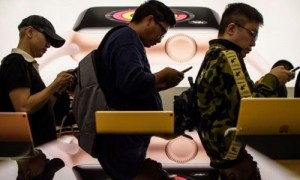Ever feel like no one really understands you? Well "Pepper" could be about to change all that.
That's because Pepper is actually a robot and touted as the world's first with the ability to read emotions.
The humanoid robot -- which looks slightly like a shrunken Michelin Man -- was unveiled to curious onlookers in Tokyo stores on Friday by SoftBank, a Japanese telecom giant and Aldebaran, a French robotics company.
Pepper doesn't look much like its name. Standing under four-feet tall with a tablet computer mounted to its chest, it has human-like hands and a mermaid-like lower torso — though its toddler-like voice seems incongruous with this state-of-the-art facade.
Despite the high-pitched voice, Pepper is able to converse about everything from the weather, to more sophisticated topics like the latest fluctuations in the stock markets.
Yet the great differentiator is the fact Pepper is fully interactive, making eye contact when meeting people.
Pepper is "the first robot to read human emotions," said Softbank's CEO Masayoshi Son told reporters at a press conference in the Japanese capital on Thursday.
"Robots like Pepper are adding a new dimension in our daily lives. They would change it with the same magnitude as the PC, Internet and mobile phones did."
How Pepper reads your moods
Using its emotion recognition functions, Pepper can react to people in its vicinity -- making jokes, dancing and even rapping (in Japanese), as it did in an onstage demonstration on Thursday.
Pepper can analyze facial expressions, human voice tones and gestures, then react autonomously through algorithms, its creators say.
"Our vision is to create an affectionate robot that can understand people's feelings. Then autonomously, it will take action," said Son.
He envisions robots playing roles in education, healthcare and entertainment, but their primary goal isn't to work in the industry like existing robots.
"Our's is not aiming for productivity, but rather at the home or store, where we provide fun and entertainment," Son said.
Pepper is designed to be a family robot -- perhaps more like a sleeker version of Rosie, the household robot on the cartoon "The Jetsons."
"Pepper is powered by love inside a family," Son said. "Not only is he making jokes, making them laugh. The robot acts out at its own expense, in natural disaster, it can help them and also comfort those people who are sad or lonely, encourage them or make them laugh."
When Pepper goes on sale
Pepper goes on sale in Japan for around US$2,000 in February 2015. For now, several Peppers are at Softbank stores in Tokyo for spectators to visit. The creators say before releasing Pepper for sale, they want the robots to accumulate more knowledge, to evolve and get more sophisticated in its interactions with humans.
"Several thousand Peppers are going to learn at the store," Son said. "Everything they learned and gained, is going to be accumulated into the cloud-based service. So that can be accelerating the evolution of the collective wisdom."
Pepper functions through cloud-based artificial intelligence.
SoftBank and Aldebaran envision the robot being sold overseas eventually. After all, Pepper is quite the polyglot, speaking 17 languages.
总是觉得没人真正了解你?那么“小辣椒(Pepper)”将会改变这一现状。
因为“小辣椒”其实是个机器人,被认为是世界上第一款能读懂人情感的机器人。
这款人形机器人看上去有点像迷你版的“米其林先生”(Michelin Man),在6月6号由日本电信巨头软银公司(Softbank)和法国机器人厂商阿德巴兰(Aldebaran)联合在东京商场向参观者揭开神秘面纱。
“小辣椒”看起来不太像它的名字。它有四英尺高,胸前有一台平板电脑,有着类似人的手臂和像鱼尾的身体——虽然它那像孩童一样的声音与它时尚感十足的外观不太相符。
“小辣椒”的声音虽然尖了点,但能聊小到天气,大到股市最新波动等复杂的话题。
不过,最大的不同点是小辣椒互动性十足,在看到人时,能与人进行眼神交流。
“‘小辣椒’是第一台能读懂人类情感的机器人,”软银公司总裁孙正义6月5号在东京举行的新闻发布会上说道。
“像‘小辣椒’这样的机器人能为我们的日常生活增添了一个新的角度。它会像计算机、互联网和手机那样给我们的生活带来翻天覆地的变化。”
“小辣椒”如何读懂你的情绪
在发布会当日,“小辣椒”在台上展示它的功能,运用情感识别功能对附近的人做出反应:讲笑话、跳舞,甚至说唱(用日语)。
研发人员称,“小辣椒”可以分析面部表情、人的语调和手势,然后通过程序自动做出反应。
“我们希望发明一个有感情的机器人,能懂人的感情,然后自主地做出反应,”孙正义说道。
他展望未来机器人能在教育、医疗和娱乐领域发挥作用,但他们的主要目标不是像目前存在的机器人那样工作。
“我们的机器人不是为了提高生产力,而是要在提供乐趣和娱乐的地方,如家里或商场里,发挥作用,”孙正义说。
“小辣椒”设计成家庭机器人——可能更像动画片《杰森一家》(The Jetsons)里的家庭机器人罗茜(Rosie)的时尚版。
“‘小辣椒’从家庭的爱获得能量,”孙正义说道。“他不仅会讲笑话,逗他们笑。这款机器人能够自主地行动,在遇到自然灾害时,它会帮助他们,还能安慰哪些伤心和孤独的人,鼓励他们,或逗他们笑。”
‘小辣椒’何时上市
“小辣椒”将于2015年2月在日本上市,售价约为2000美元。现在,软银公司的东京商城有几台样机供人参观。“小辣椒”的研发人员称,在“小辣椒”上市之前,他们想让这些机器人积累更多知识,在与人交流时能演进,变得更老道。
“有数千台‘小辣椒’机器人将在商场里学习,”孙正义说。“他们学习和获取的一切东西都将汇集到云端服务里。这会加快集体智慧的进化。”
“小辣椒”通过云端人工智能运行。
软银公司和Aldebaran机器人公司期望这款机器人最后能销往海外。毕竟,“小辣椒”通晓多种语言,能说17种语言。
相关阅读:







